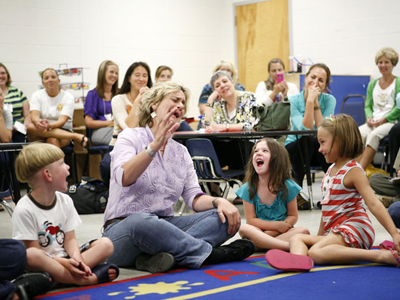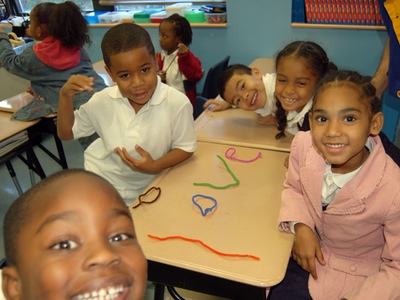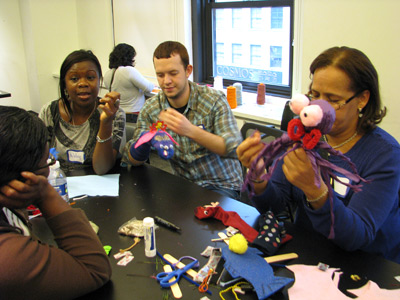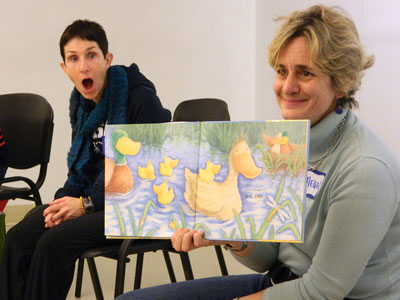Early Learning
NYC Wolf Trap
CAT’s Early Learning Program (ELP) uses interactive drama strategies to strengthen literacy, critical thinking, and essential social-emotional skills among pre-k through 2nd grade students. Additionally, the ELP team trains teachers in participant-centered pedagogy and drama strategies to help them meet Common Core Standards and better engage young people, including English Language Learners and students with disabilities.
From 2014 - 2019, with the support of the NYCT Brooke Astor Fund for NYC Education, ELP provided an intensive matrix of professional development workshops, in-class residences, and parent workshops to 20+ New York City public schools to bolster literacy skills among high-poverty students. ELP’s groundbreaking work with early childhood students and their teachers continues to prompt requests from across the country and internationally for CAT staff to share their work.
Watch a video about our Astor Project!
CAT is an approved New York State Education Department Sponsor of Continuing Teacher & Leader Education (CTLE) and NYC DOE Vendor.
Wolf Trap Institute for Early Learning Through the Arts is a program of Wolf Trap Foundation for the Performing Arts.
CAT is an approved New York State Education Department Sponsor of Continuing Teacher & Leader Education (CTLE) and NYC DOE Vendor.
CAT offers professional development and mentoring projects for educators who have few opportunities for intensive skill-building. Previous curriculums have included:
-
Guided professional development – both theory and practice – on how drama strategies support emergent literacy skills, such as recall, sequencing, projection, inference, oral language and vocabulary.
-
High-quality, direct services to early childhood students in support of their English language acquisition, emergent literacy, and essential social-emotional skills.
Contact Shamilia McBean or Chris Tokar to learn how to bring CAT to your school or site.
The goal of CAT's Early Learning Program is to support children’s development of life and literacy skills and to give educators creative ways to support those skills:
For students: CAT workshops are designed to support the Blueprint for Teaching and Learning in the Arts and the New York State Common Core Learning Standards, including these specific standards addressed by CAT's Early Learning workshops.
For Educators: CAT professional development workshops are designed to encourage teachers to incorporate drama-based activities into the classroom to promote children’s English acquisition and early literacy, social development, critical thinking skills, and emotional growth.
Outcomes:
“I am a Dual Language teacher… The actor that worked with me gave me the option to do the different activities in Spanish. Using interactive drama strategies, oral language skills and vocabulary development in Spanish helped me to support my English-dominant students in their second-language acquisition and to develop their essential social-emotional skills.” — Participating Early Childhood Educator
“CAT is implementing a highly successful mentorship and professional development program to incorporate interactive drama strategies in literacy instruction. Based on evidence from ongoing evaluation, the program is generating change in the way reading is taught and supported in grades K-2. CAT-ELP shows potential for improving foundational and higher-order reading skills including phonemic awareness, oral language, vocabulary development, inferencing, and analyzing characters' point-of-view.” — CUNY Office of Research, Evaluation, and Program Support
CAT’s interactive, student-centered approach has proven successful across ages and abilities. Our teachers say it best:
"Children who hadn’t spoken all year were, all of a sudden, speaking. Children who were unable to express themselves, whether it was through voice or through actions, were able to participate, to be part of a group—to contribute in a positive way without being pointed out in a negative way. It was an awesome experience for them."
"The children became storytellers. A lot of them could retell the stories they heard using facial gestures, movements, and voice changes. They are very attentive during the storytelling; it captures their attention. They feel like they are part of the story, and they really enjoy it."
"So many teachers have one way of thinking and teaching. Storytelling takes you outside the box. It is not only where teachers need to go, but where administrators need to go. That’s where we want our kids to go – to think outside the box, so we have to model it."
"As the special education teacher, I feel the play movements enhance the children’s 'focus' on the story. I also feel storytelling, with its physical movements, silly questions, or actions actually create a more cohesive atmosphere in the classroom. It’s as if the 'playing field' has been altered and my kids are having the same opportunities as everybody else to compete and follow along with the story. I really do enjoy using storytelling to enhance and further interactive experiences for all children."
Based on interest in CAT’s successful model, the Early Learning Program has provided both direct services and professional development to teachers and students in national and international schools. CAT’s Early Learning Program has been invited to lead workshops and residencies across and outside the country and inspired a number of articles and educational research projects.
IN THE BEGINNING: IN-CLASS DRAMAS
An ongoing collaboration with classroom teachers has been a vital part of the Early Learning Program’s growth and evolution. Created in 1993 to take CAT’s issue-based drama work into the early childhood classroom, the program initially worked with a few NYC DOE schools and then partnered with New York City’s Administration for Children’s Services (ACS) to offer five-day residencies with citywide Head Start programs. Click here to read about the history of the Early Learning Program and below for story synopses of our two-person, interactive dramas:
Alphabet Keepers – a drama about a group of elves in the Land of Letters
Magic Drum – Set in Nigeria, this drama explores the issue of inclusion and exclusion
The Tale of the Tancho – A ground-breaking drama that examines the responsibility of a community in the face of a bully
Who Stopped the Rain? – A story that explores the impact of litter on a family of rabbits’ farm
REPORTS & PUBLICATIONS
Based on increased interest in CAT’s successful model, the Early Learning Program has provided both direct services and professional development to teachers and students in national and international schools. CAT’s Early Learning Program has been invited to lead workshops and residencies across and outside the country and inspired a number of articles and educational research projects. Click here to find Articles, Blogs and Reports about the Early Learning Program.
Click here to see how our work supports the Common Core Standards: Approaching the Common Core Standards through Interactive Storytelling.
Through CAT’S interactive drama and storytelling, students and teachers explore many themes, including:
- Resilience
- Determination
- Self-worth
- Being true to oneself
- Respect for language
- Creative problem-solving
- Empathy and self-regulation
- Respect for the environment
- Oral and physical literacy
Approaching the Common Core Standards through Interactive Storytelling
Media Gallery
Let's Talk
Shamilia McBean
Project Director
Early Learning, CASA
(212) 652-2836
Shamilia.McBean@cuny.edu
Tessa Pantuso
Program Manager
Early Learning, CASA
(212) 652-2806
Tessa.Pantuso@cuny.edu
Chris Tokar
Director of Resource Development
(212) 652-2850
Chris.Tokar@cuny.edu
CUNY-CAT is an approved NYSED CTLE Sponsor and NYC DOE Vendor.

















.jpg)


e.jpg)







